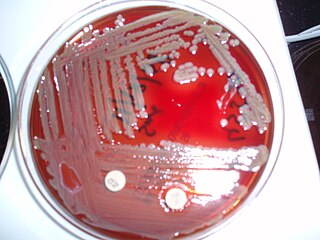Related Research Articles

The family Flavobacteriaceae is composed of environmental bacteria. Most species are aerobic, while some are microaerobic to anaerobic; for example Capnocytophaga and Coenonia.
Yeosuana aromativorans is a species of non-motile aerobic marine bacterium that can degrade benzopyrene. It was first isolated from Gwangyang Bay and forms yellow-brown colonies requiring chlorides of both magnesium and calcium.
Undibacterium is a genus of Gram-negative, oxidase- and catalase-positive Betaproteobacteria in the Oxalobacteraceae family. Undibacterium bacteria occurs in drinking water.
Bizionia is a strictly aerobic genus from the family of Flavobacteriaceae which produce carotenoids. Bizionia is named after Bartolomeo Bizio.
Mariniflexile is a genus in the phylum Bacteroidota (Bacteria). The various species have been recovered from sea water, sea urchins, springs, brackish water, and an oyster.
Gaetbulibacter saemankumensis is a Gram-negative and rod-shaped bacterium from the genus of Gaetbulibacter which has been isolated from tidal flat sediments from the Yellow Sea.
Joostella atrarenae is a Gram-negative and motile bacterium from the genus of Joostella which has been isolated from black sea sand from the Jeju Island.
Lutibacter is an aerobic or facultatively anaerobic genus of bacteria from the family of Flavobacteriaceae.
Pibocella is a Gram-negative heterotrophic and aerobic genus of bacteria from the family of Flavobacteriaceae with one known species Pibocella ponti. Pibocella ponti has been isolated from the alga Acrosiphonia sonderi.
Euzebyella algicola is a Gram-negative, aerobic and rod-shaped bacterium from the genus of Euzebyella which has been isolated from a green algae from the Jeju Island.
Hoppeia is a Gram-negative, rod-shaped and strictly aerobic genus of bacteria from the family of Flavobacteriaceae with one known species.
Hwangdonia is a Gram-negative, rod-shaped, aerobic and non-motile genus of bacteria from the family of Flavobacteriaceae with one known species. Hwangdonia seohaensis has been isolated from sediments of tidal flat from Hwangdo in the Yellow Sea.
Hyunsoonleella jejuensis is a Gram-negative, aerobic, rod-shaped and non-motile bacterium from the genus of Hyunsoonleella which has been isolated from seawater from the coast of the Jeju Island.
Jejudonia is a Gram-negative, rod-shaped and non-motile genus of bacteria from the family of Flavobacteriaceae with one known species.
Jejuia pallidilutea is a Gram-negative and aerobic bacterium from the genus of Jejuia which has been isolated from seawater from the coast of Jeju Island.
Namhaeicola is a Gram-negative, pleomorphic and non-motile genus of bacteria from the family of Flavobacteriaceae with one known species. Namhaeicola litoreus has been isolated from seawater from the South Sea in Korea.
Pontimicrobium is a Gram-negative, strictly aerobic, non-spore-forming, rod-shaped and non-motile genus of bacteria from the family of Flavobacteriaceae with one known species. Pontimicrobium aquaticum has been isolated from seawater.
Seonamhaeicola aphaedonensis is a Gram-negative, rod-shaped and non-motile bacterium from the genus of Seonamhaeicola which has been isolated from tidal flat sediments from the Aphae Island.
Sungkyunkwania is a Gram-negative, rod-shaped and non-motile genus of bacteria from the family of Flavobacteriaceae with one known species. Sungkyunkwania multivorans has been isolated from a seaweed farm from the South Sea from Korea. Sungkyunkwania is named after the Sungkyunkwan University.
Taeania is a Gram-negative, rod-shaped and non-motile genus of bacteria from the family of Flavobacteriaceae with one known species. Taeania maliponensis has been isolated from seawater from Korea.
References
- 1 2 3 4 "Genus: Gangjinia". lpsn.dsmz.de.
- 1 2 Lee, Dong-Heon; Moon, Sung-Ran; Park, Young-Hyun; Lee, Young Sun; Jung, Jae Sung; Kim, Jung Ho; Kim, Hoon; Kahng, Hyung-Yeel (1 February 2011). "Gangjinia marincola gen. nov., sp. nov., a marine bacterium of the family Flavobacteriaceae". International Journal of Systematic and Evolutionary Microbiology. 61 (2): 325–329. doi: 10.1099/ijs.0.021592-0 .